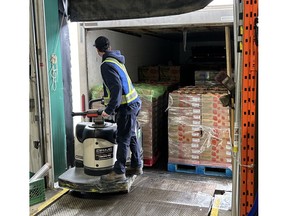Demand at food banks expected to surge as people renew mortgages
Executive director says food banks are seeing a new kind of client - homeowners with two parents working

Article content
Stéphane Sirois predicts a surge in demand at food banks this year when people begin to renew the mortgages on their homes.
The executive director of the New Brunswick Food Depot Alimentaire in Moncton says in the two years he’s been with the nonprofit organization, he’s already seen a doubling of demand, as food costs rose and higher interest rates pushed up people’s borrowing costs, leaving them with little spending money.
“The most troubling increase we saw last year was among families where both parents were working, who still needed some help,” Sirois said in an interview. “We’re also seeing more homeowners. Before, we’d see more people who were renting. But now, with interest rates going up, you might get hit with an extra $400 or $500 a month to pay. That could tip you over the edge. And that’s what we’ve been seeing.”
That’s why he’s glad the provincial government announced Monday it would renew $2 million in funding to Food Depot Alimentaire for buying fresh food to supply 65 soup kitchens and food banks across the province. The organization last year spent $16 million on its food budget, with most of it coming from corporate funding, private donations and its weekly 50-50 Goldrush draw. The lottery alone provides about $60,000 a week in extra revenues.
We all feel the pinch. You go to the grocery store and gas station, and prices are way up.
Stéphane Sirois
Last year the organization distributed over two million kilograms of food as New Brunswick food banks served an average of 26,000 clients a month – a 35 per cent hike over the year before.
Community kitchens served an average of 36,500 meals per month last year, representing a 17 per cent increase over 2022.
Each year, the individual food banks and its main distributor, Food Depot Alimentaire, apply for funding from the province. In the aftershock of the pandemic, inflation soared – New Brunswick had the highest consumer price index increase in the country in 2022, at over seven per cent – and demand at the charities soared.
The Higgs Progressive Conservative government stepped in to ease some of the pain.
“We all feel the pinch,” the executive director said. “You go to the grocery store and gas station, and prices are way up. And it’s not unique to New Brunswick. This is happening across the country. We’re part of Food Banks Canada and everyone’s in the same situation. Rents are increasing, food costs are increasing and wages are not necessarily keeping up. On top of that we have a lot of newcomers and population growth, especially in Fredericton, Moncton and Saint John.”
Food Depot Alimentaire’s fresh food budget is about $3.5 million a year, with the rest of it canned or nonperishable. The provincial money will go toward the fresh food fare.
Health Minister Bruce Fitch made the announcement in Moncton on Monday morning. A reporter asked whether $2 million was enough, given the increased demand of hungry families.
He replied that his Tory government had found several ways to help. For instance, Premier Blaine Higgs announced at his State of the Province speech last week a $300 affordability cheque would go to the most needy households. It is also providing a low-income seniors benefit of $600 in April and increasing minimum wage on April 1, from $14.75 to $15.30.
“There’s different ways of helping people,” said the Riverview MLA. “There are a number of initiatives out there going toward individuals and organizations to help.”
Sirois said they’d take any help they could get.
“We would take more, of course, because the number of people and families using our services have gone up significantly in 2023. But we’re also able to offset a lot of the costs with our 50/50 draw. It’s been around for about 10 years and it’s doing really well. If we didn’t have that, we would have asked the province for a lot more money.”











Postmedia is committed to maintaining a lively but civil forum for discussion. Please keep comments relevant and respectful. Comments may take up to an hour to appear on the site. You will receive an email if there is a reply to your comment, an update to a thread you follow or if a user you follow comments. Visit our Community Guidelines for more information.